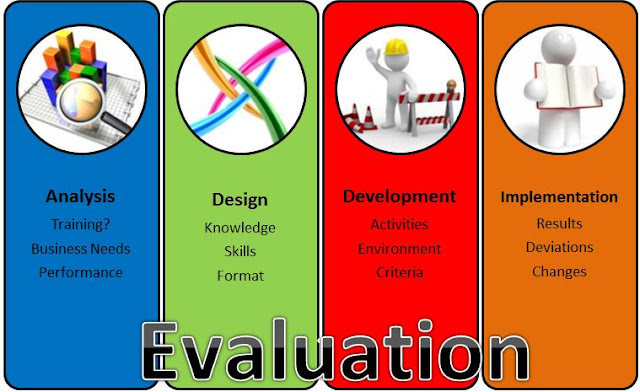ADDIE - Evaluation Phase
Evaluation Phase
Evaluation in ISD
Background
Definition
Evaluation is the systematic determination of merit, worth, and significance of a learning or training process by using criteria against a set of standards.
The primary purpose is to ensure that the stated goals of the learning process will actually meet the required business need.
Ongoing
Evaluation is performed in an ongoing process throughout the first four phases of ISD
In Analysis, it looks at deciphering whether the performance problem is a training problem. If it is, how will a learning platform positively impact a business need or goal? Then, what must the learners be able to do in order to ensure the required change in performance?
In Design, evaluation occurs when you identify what must be learned by the learners that will enable them to fulfill the required business need or goal.
In Development, you find the activities that will best bring about the required performance.
In Implementation, you find out if the learners have now become performers.
Phase
It is taken one step farther by ensuring that the learner can actually meet the new performance standards once they have completed their training and returned to their jobs. And secondly, ensuring that the business need or goal is actually being met.
Purpose
Reich’s Gap
The gap between what the teacher teachers and what the student learns.
Evaluation helps to measure the gap by determining the value and effectiveness of a learning program.
Bramley and Newby (1984)
Feedback
Control
Research
Intervention
Power Games
ROI
Evaluation ensures that training support the business units’ needs. This is primarily because stakeholders for the most part do not view training as a profit center but rather as a strategic partner who supports their goals.
Types of Evaluations
Formative
Definition
A formative evaluation, sometimes referred to as internal, is a method for judging the worth of a program while the program activities are forming, or in progress. This part of the evaluation focuses on the process
Purpose
Its main purpose is to catch deficiencies so that the proper learning interventions can take place that allow the learners to master the required skills and knowledge.
Wally Guyot
Formative evaluation is primarily a building process which accumulates a series of components of new materials, skills, and problems into an ultimate meaningful whole
Summative
Definition
A summative evaluation, sometimes referred to as an external, is a method of judging the worth of a program at the end of the program activities, summation.
Methodology
The model used to gather the date should be a specified step-by-step procedure.
History
Scriven (1967)
Formative evaluation was intended to foster development and improvement within an ongoing activity. Summative evaluation is used to assess whether the results of the object being evaluated met the stated goals.
Saettler (1990)
Formative is used to refine goals and evolve strategies for achieving goals while summative is undertaken to test the validity of a theory or determine the impact of an educational practice so that future efforts may be improved or modified.
Today
Most organizations are demanding shorter design times. Thus the formative part is move over to the other methods, such as through the use of rapid prototyping and using testing and evaluation methods to improve as one moves on. Which, of course, is not as accurate but it is more appropriate to most organizations as they are not really that interested in accurate measurements of the content but rather the end product, namely skilled and knowledgeable workers.
Kirkpatrick’s Evaluation Model
Stages
Reaction
How the learners react to the learning process
Learning
The extent to which the learners gain knowledge and skills
Behavior (Performance)
Capability to perform the learned skills while on the job
Results
Includes such items as monetary, efficiency, morale









Comments
Post a Comment